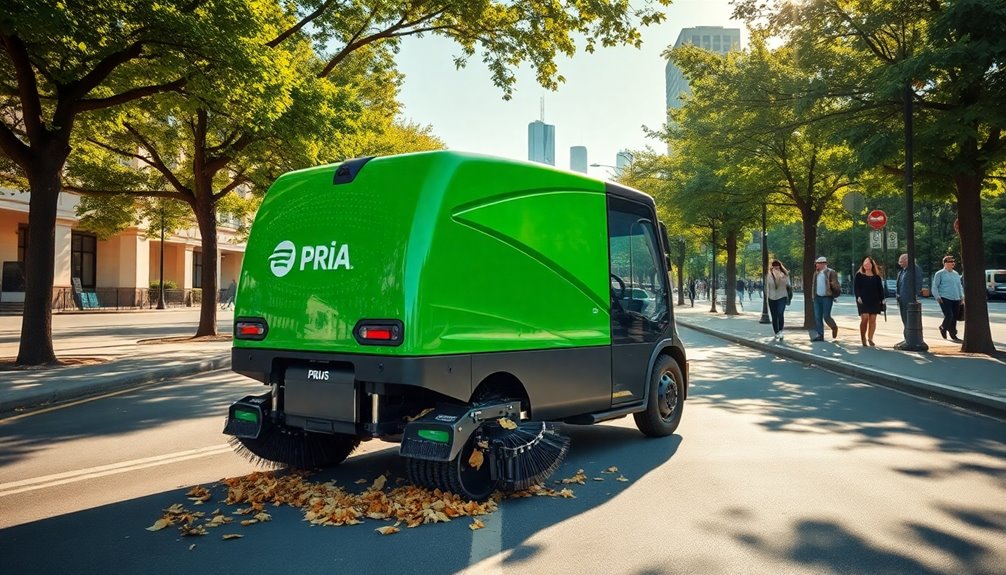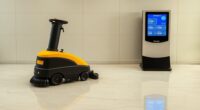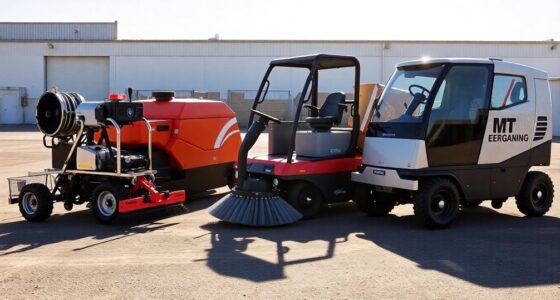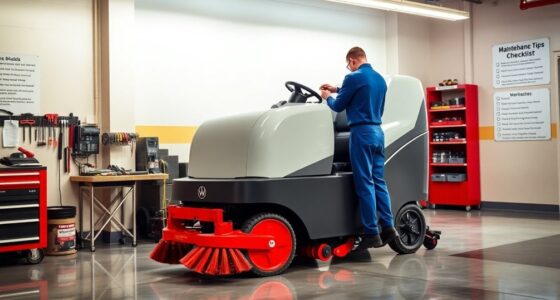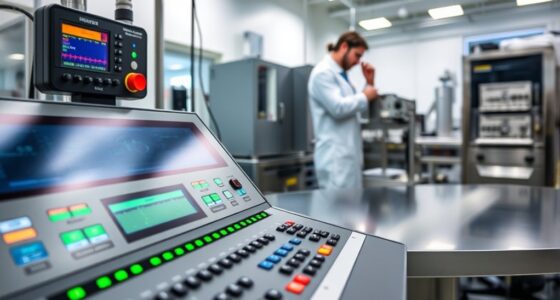Electric road sweeping machines are transforming urban cleanliness with their zero-emission technology and advanced cleaning capabilities. They operate quietly, allowing nighttime cleaning that minimizes disturbances for residents, while also reducing CO2 emissions considerably. Successful implementations in cities like Helsinki showcase strong community support and impressive results. With features like quick charging and smart route optimization, these machines pave the way for cleaner, healthier urban environments. Discover how these innovations are shaping the future of street cleaning.
Key Takeaways
- Helsinki's pilot program showcased electric sweepers' effectiveness in improving urban cleanliness with zero emissions and strong community support for nighttime operations.
- Nottingham City Council aims for 22% of its fleet to be ultra-low emission by 2020, enhancing air quality and street maintenance.
- Electric sweepers significantly reduce CO2 emissions, averaging 26 tons annually per unit, contributing to cleaner urban environments.
- Community engagement and awareness regarding dust pollution health risks have increased, leading to positive feedback on the quiet operation of electric sweepers.
- Challenges include potential energy waste and high replacement costs, but advancements in technology optimize cleaning routines and minimize environmental impact.
Overview of Electric Road Sweeping Machines
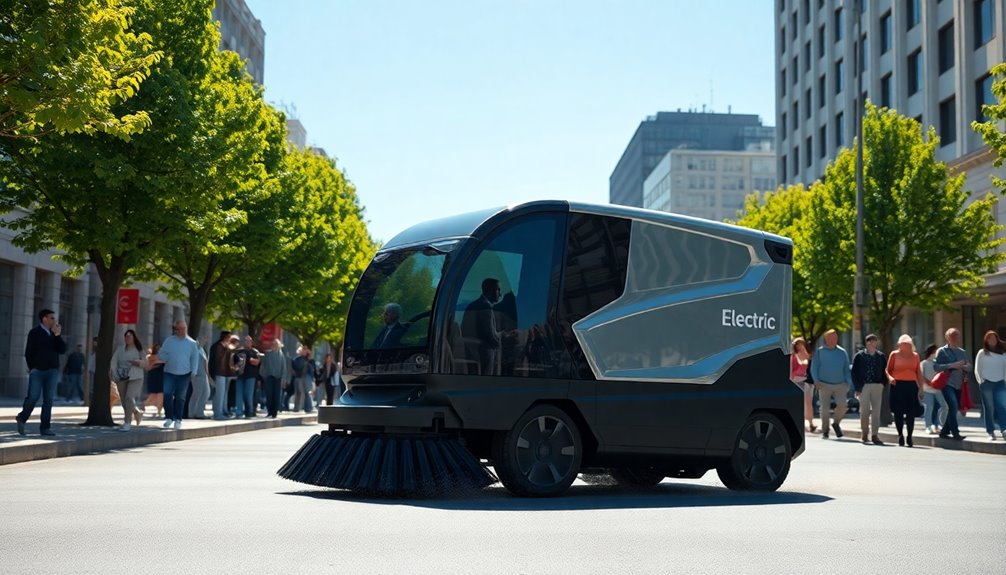
Electric road sweeping machines are revolutionizing urban cleanliness with their eco-friendly capabilities.
These electric sweepers, like the Boschung Urban-Sweeper S2.0, operate with zero emissions, greatly improving air quality in urban areas.
You'll appreciate their quick charging time of just 2 hours, ensuring efficient operation without long downtimes.
With a payload capacity of 1.2 tons and a lightweight design of 3.5 tons, these sweepers enhance maneuverability and cleaning efficiency.
Plus, they're quieter than traditional models, allowing for nighttime cleaning without disturbing residents, which more than 90% of the community supports.
Shifting to electric sweepers is part of broader initiatives, like Nottingham City Council's goal to have 22% of its fleet as ultra-low emission vehicles by 2020.
Environmental Benefits of Electric Sweepers
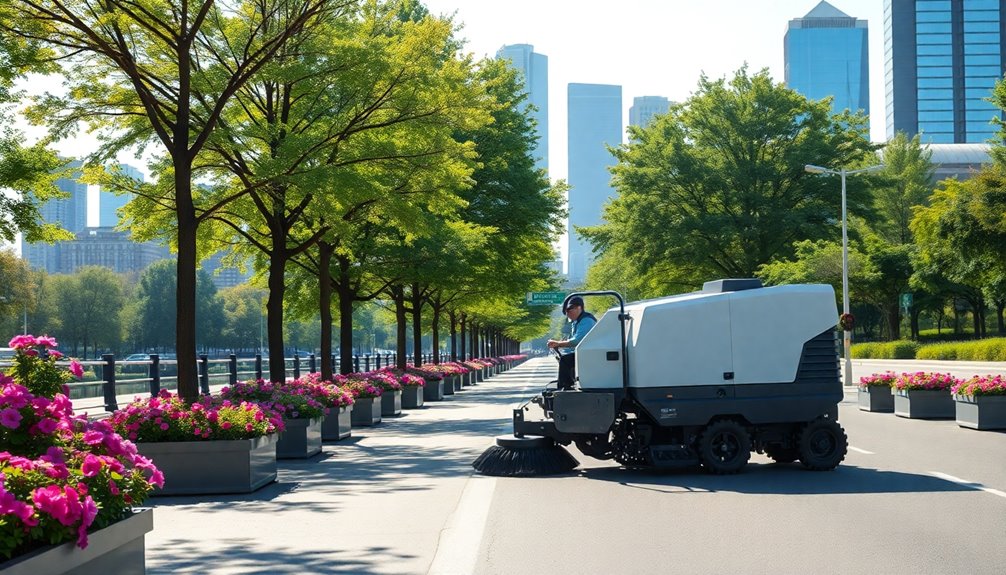
When you think about urban cleanliness, electric sweepers stand out for their zero-emission operation, making a significant difference in air quality.
Plus, their quiet performance means you can schedule cleaning at night without disturbing residents.
These benefits not only enhance public health but also contribute to a more sustainable environment.
Zero Emission Operation
As cities endeavor for cleaner air and healthier environments, the adoption of electric street sweepers offers a compelling solution by producing zero emissions.
This shift not only enhances urban air quality but also aligns with sustainability goals.
Here's how electric sweepers contribute to a greener future:
- Eliminate pollutants from traditional diesel machines
- Reduce CO2 emissions by approximately 26 tons annually per unit
- Lower energy consumption to just 15% of conventional machinery
- Support urban initiatives against dust pollution and health risks
- Promote operational efficiency while reducing overall energy costs
Noise Reduction Benefits
Cities aiming for cleaner environments benefit not only from zero emission operations but also from considerably lower noise levels produced by electric street sweepers.
These machines operate at notably reduced noise levels compared to traditional diesel models, allowing for nighttime cleaning without disturbing residents. The quiet operation of electric street sweepers enhances urban soundscapes, contributing to a better quality of life in densely populated areas.
For example, the Boschung Urban-Sweeper S2.0 aligns with Nottingham City Council's goals to minimize noise pollution. By deploying electric sweepers during off-peak hours, cities can keep streets clean while reducing daytime disruptions and traffic congestion.
Improved Urban Air Quality
Improved urban air quality is an essential benefit of using electric road sweepers, since these machines produce zero emissions and greatly cut down on harmful pollutants like nitrogen dioxide and particulate matter.
Shifting to electric street sweepers can lead to significant environmental improvements, including:
- Reduction of CO2 emissions by approximately 26 tons annually per machine
- Nighttime cleaning that minimizes traffic congestion
- Advanced dust control and filtration systems capturing fine particles
- Compliance with PM10 standards, protecting public health
- Support for initiatives like Nottingham City Council's commitment to ultra low emission vehicles
Technological Innovations in Street Cleaning
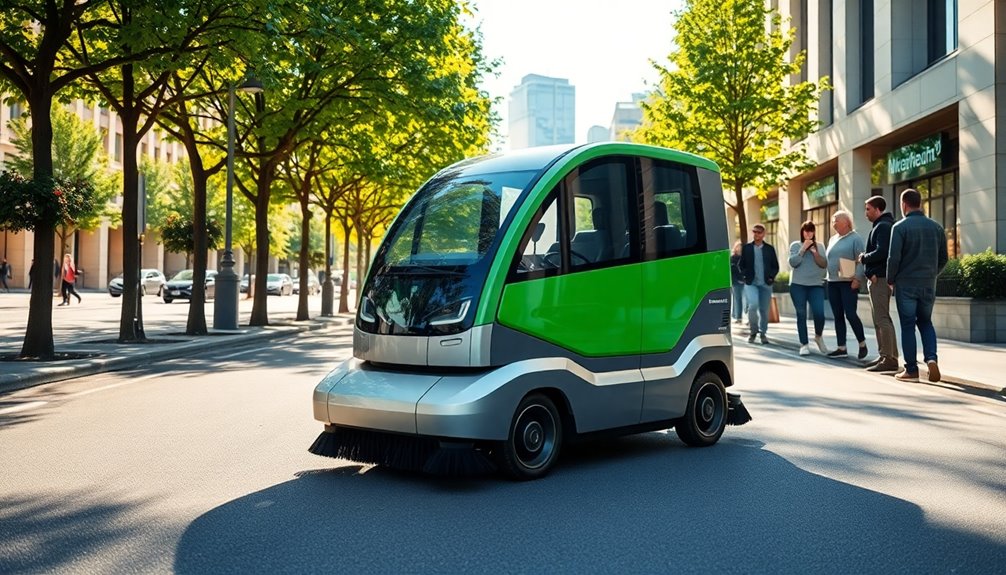
You'll be amazed at how advanced cleaning technologies are reshaping street cleaning.
With smart sensor integration, these electric road sweepers optimize routes and enhance efficiency, making urban areas cleaner and more sustainable.
Let's explore how these innovations are changing the game in urban maintenance.
Advanced Cleaning Technologies
The landscape of urban cleanliness is rapidly evolving with advanced cleaning technologies that enhance street maintenance efficiency.
Electric sweepers are at the forefront, integrating various innovations to improve performance.
Here are some key features you'll find in modern sweepers:
- Mechanical broom sweepers use durable synthetic materials for better brush performance and longer lifespan.
- Vacuum sweepers boast advanced suction power, collecting fine dust and debris effectively.
- Regenerative air sweepers utilize powerful air blasts to dislodge debris while minimizing dust.
- Electric and hybrid models produce zero emissions, supporting strict air quality standards.
- Smart technologies optimize routes, reducing fuel consumption and improving fleet management.
These advancements are essential for maintaining clean urban environments and promoting sustainability.
Smart Sensor Integration
As urban areas seek to enhance cleanliness, smart sensor integration in electric road sweeping machines plays a pivotal role in optimizing operations. By utilizing GPS and telematics, you can greatly reduce fuel consumption and operational time. Real-time monitoring systems track performance metrics, allowing for data-driven decisions that improve street cleaning. Additionally, incorporating advanced dust filtration technologies can significantly contribute to better air quality in urban environments.
| Feature | Benefit |
|---|---|
| Predictive Maintenance | Minimizes downtime |
| Advanced Dust Filtration | Enhances air quality |
| Real-time Performance Tracking | Facilitates quick adjustments |
| Optimized Cleaning Routes | Reduces fuel use |
| User-friendly Interfaces | Simplifies monitoring |
With smart sensor integration, your road sweeper becomes a powerful tool, ensuring efficient and effective cleaning while complying with environmental standards.
Operational Efficiency and Cost Savings
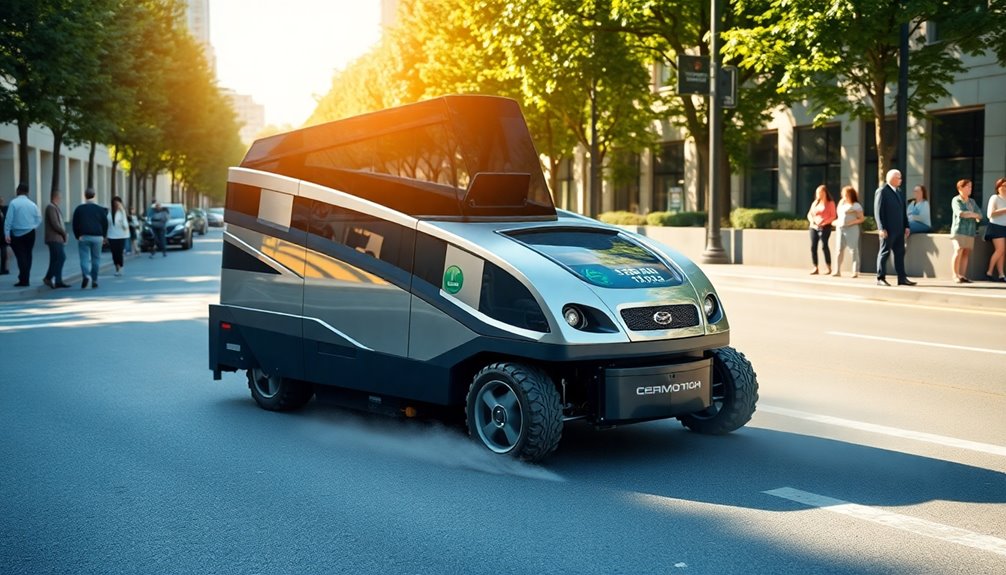
While many cities face the challenge of maintaining cleanliness without disrupting daily life, electric road sweeping machines offer a solution that enhances operational efficiency and drives cost savings.
By utilizing these advanced machines, you can benefit from:
- Low energy consumption—only 15% of traditional diesel-powered sweepers
- Significant CO2 reduction—saving up to 26 tons annually per Trombia Free
- Nighttime cleaning—less daytime traffic congestion
- Quieter operations—minimizing disturbances for residents
- AI optimization—potentially saving over 80% in electrical power consumption
These features not only streamline the cleaning process but also contribute to long-term cost savings in fuel and maintenance.
Shifting to electric sweepers makes urban cleaning more efficient, sustainable, and acceptable to the public.
Case Studies: Successful Implementations
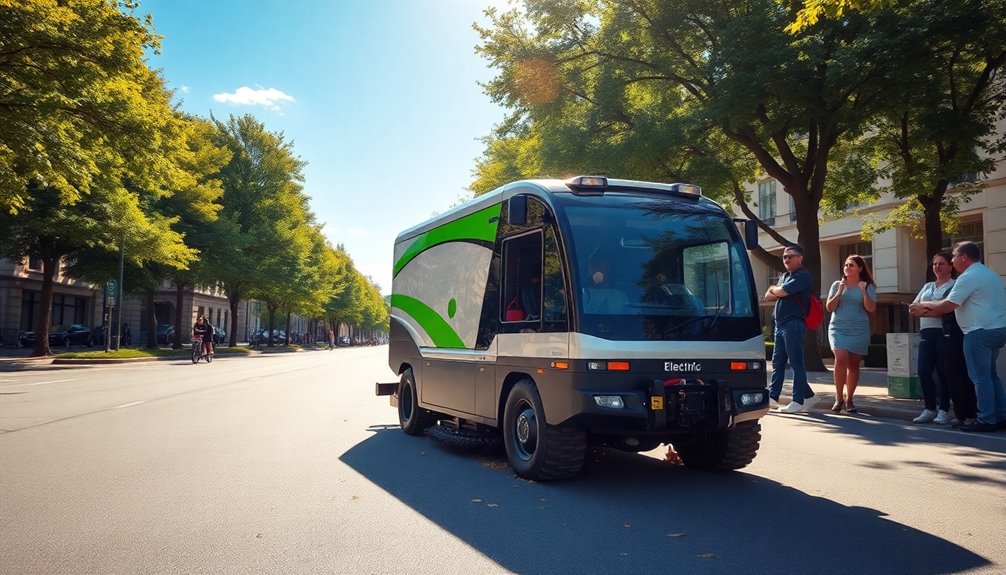
Let's explore some successful implementations of electric road sweeping machines that showcase their impact on urban cleanliness.
For instance, Helsinki's pilot program demonstrated impressive cleaning results and zero emissions, while Nottingham's electric fleet aligns with its air quality goals.
These case studies illustrate how advanced cleaning technologies are transforming urban environments.
Pilot Program Results
Pilot programs for electric road sweeping machines have shown remarkable success in urban areas, demonstrating their potential to enhance cleanliness and reduce emissions.
In Helsinki, the Trombia Free autonomous street sweeper achieved outstanding results, gathering strong community support for nighttime operations. Here are some key outcomes:
- Over 90% of residents backed the nighttime cleaning initiative.
- Each Trombia Free sweeper can cut CO2 emissions by 26 tons annually.
- The initiative raised awareness about urban cleanliness and dust pollution health risks.
Nottingham's Boschung Urban-Sweepers S2.0 guaranteed zero emissions and quieter operations.
The city aimed for 22% of its fleet to be ultra-low emission vehicles by 2020.
These pilot programs highlight how electric sweepers can transform urban environments.
Nottingham's Electric Fleet
Nottingham's commitment to enhancing urban air quality is evident through the successful implementation of its electric fleet, which includes four Boschung Urban-Sweepers S2.0.
Acquired in November 2018 and operational since May 2019, these electric sweepers produce zero emissions, aligning perfectly with Nottingham's goal to convert 22% of its fleet to ultra-low emission vehicles by 2020. Their quick two-hour charging time guarantees they can handle full operational shifts efficiently.
Furthermore, the shift to electric machines has greatly reduced noise pollution, creating a quieter environment for residents. City officials, like Jason Gooding, have praised this move, noting it as a major advancement for clean air in Nottingham. The city's efforts are complemented by stringent safety precautions to ensure the effectiveness and efficiency of its electric fleet.
The electric sweepers are an essential step toward a cleaner, healthier urban space.
Advanced Cleaning Technologies
As urban areas face increasing pressure to maintain cleanliness while reducing emissions, cities are turning to advanced cleaning technologies that offer innovative solutions.
These approaches enhance street cleaning efficiency and environmental sustainability. Here are some successful implementations:
- The Trombia Free autonomous street sweeper in Helsinki, reducing CO2 emissions by 26 tons annually.
- Nottingham's Boschung Urban-Sweepers S2.0, fully electric vehicles with quick 2-hour charging.
- Advanced vacuum sweepers with improved suction for fine dust and debris.
- Smart sensors and automation for optimized routes and reduced fuel consumption.
- Electric and hybrid sweepers, ensuring zero emissions in urban areas.
- Incorporating energy-efficient technology in street cleaning operations promotes sustainable urban practices.
Resident Feedback and Community Impact
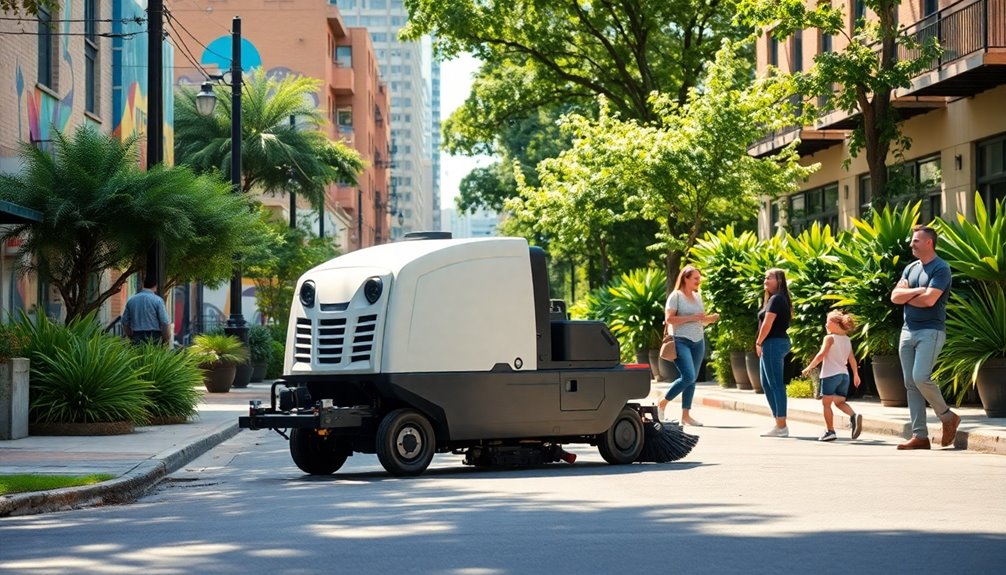
A remarkable 90% of Helsinki residents back nighttime cleaning initiatives, reflecting a strong community endorsement of the Trombia Free autonomous street sweeper program. Minimal disruption was reported during the pilot, thanks to effective communication. The program raised awareness about dust pollution, with over 30% quartz dust identified as a health hazard.
| Feedback Aspect | Community Response |
|---|---|
| Support for Night Cleaning | 90% endorsing initiatives |
| Awareness of Health Risks | Increased discussions on dust |
| Satisfaction with Noise | Positive feedback on quiet |
Community engagement flourished as residents discussed sustainable urban maintenance, emphasizing the importance of clean environments for public health. Overall, the pilot considerably impacted resident perceptions and satisfaction with urban cleanliness efforts.
Future Developments in Urban Cleaning Solutions
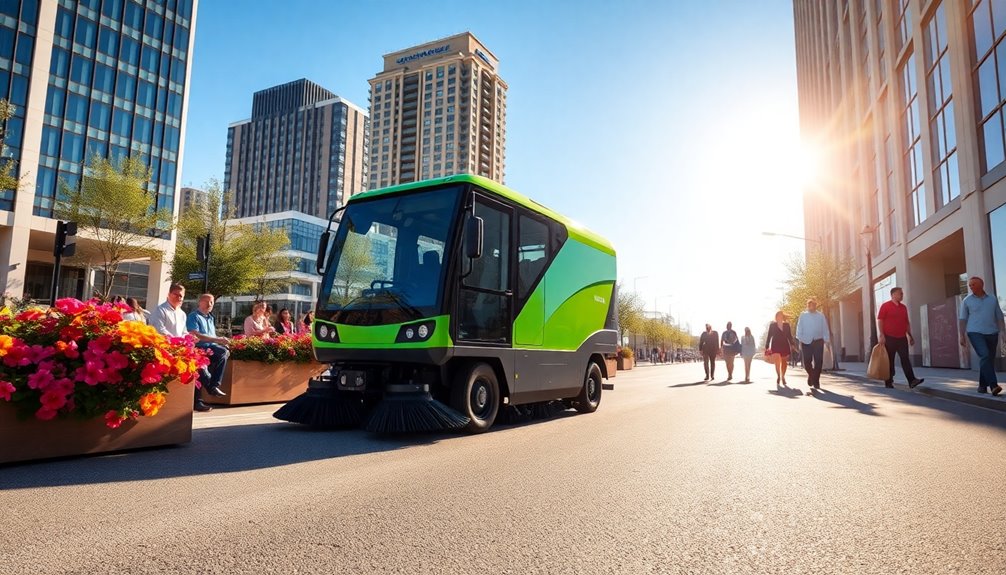
While cities like Helsinki and Nottingham are already making strides in urban cleanliness, future developments promise even more innovative solutions to enhance sustainability and efficiency.
You can expect the following advancements in road sweeping:
- Trombia Free systems: Launching in Helsinki, focusing on enhancing urban sustainability.
- Ultra-low emission vehicles (ULEVs): Nottingham aims for 22% of its fleet to be fully electric Boschung Urban-Sweepers S2.0.
- Zero emissions: The Trombia Free can reduce CO2 emissions by 26 tons annually per unit.
- Advanced cleaning mechanisms: New vacuum and regenerative air sweepers will minimize noise and effectively capture fine dust.
- Smart sensors and automation: Ongoing research into GPS and telematics will optimize routes and enhance fleet management.
These innovations will redefine urban cleaning solutions for a cleaner, healthier environment.
Challenges and Limitations of Current Technologies
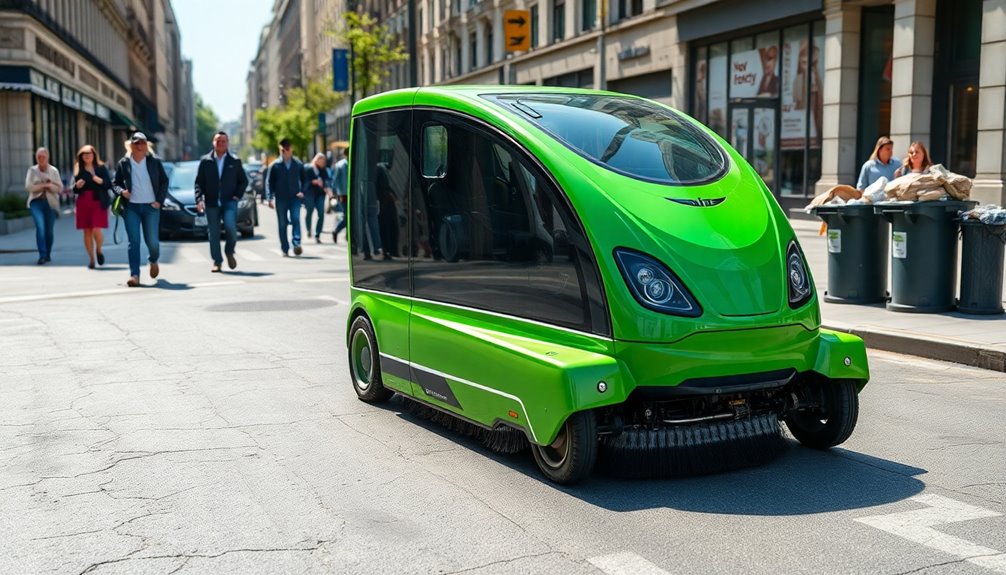
Despite advancements in urban cleaning technologies, significant challenges persist that hinder their effectiveness and sustainability. Many street sweeping machines operate at full power, wasting energy and increasing operational costs, even when it's unnecessary.
The wear and tear on components like brushes leads to high replacement costs and contributes to environmental pollution from discarded materials. Inconsistencies in cleaning routines arise from human operators who may overlook the diverse litter types on different streets.
Battery-powered sweepers struggle with energy limitations, making it tough to complete daily tasks efficiently, especially in larger urban areas. Additionally, traditional machines still rely on fossil fuels, exacerbating urban air pollution and restricting their use in regions with strict air quality standards. Energy-efficient technology can provide innovative solutions to address these challenges while reducing operational costs.
Integrating Smart Sensors for Enhanced Performance
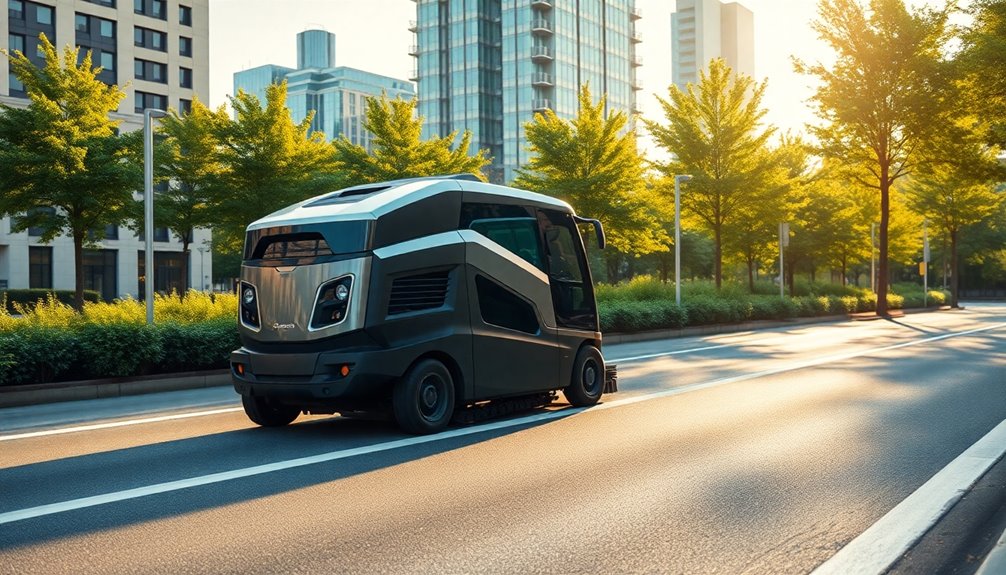
Integrating smart sensors into electric road sweeping machines revolutionizes urban cleanliness by enhancing their operational performance.
These sensors leverage GPS and telematics for optimized routes, reducing fuel consumption and operational time.
You'll appreciate the benefits of enhanced monitoring and data analytics, which include:
- Real-time tracking of fuel efficiency and sweeping performance
- Predictive maintenance to identify potential issues early
- Advanced dust control systems that capture fine particles
- User-friendly interfaces for informed operational adjustments
- Reduced operator fatigue through efficient task management
With smart sensors, you'll see a significant improvement in air quality and operational effectiveness, making urban environments cleaner and healthier for everyone.
Embrace the future of urban cleanliness through these innovative technologies!
Commitment to Sustainable Urban Management
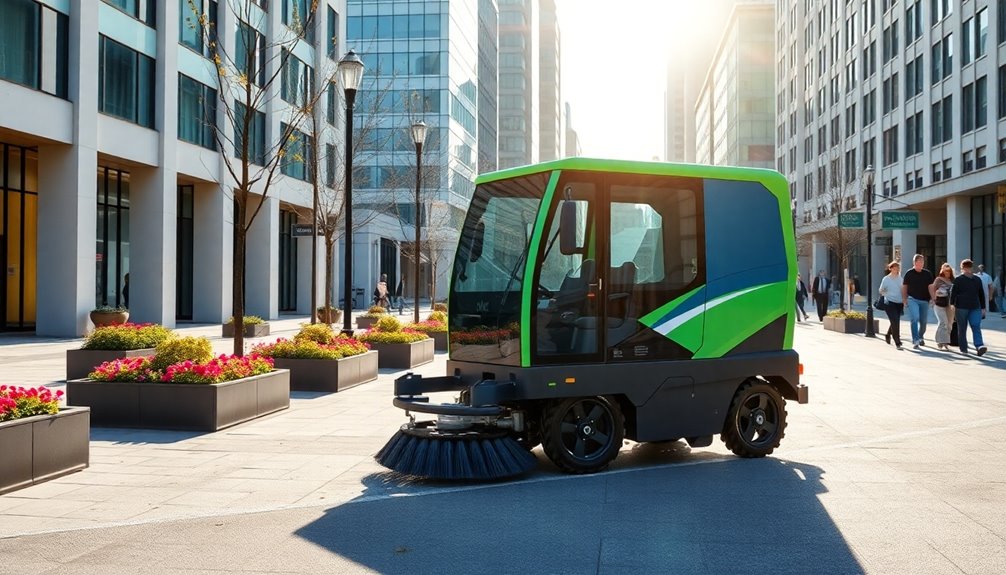
The integration of smart sensors in electric road sweeping machines sets a strong foundation for a broader commitment to sustainable urban management.
By converting 22% of its fleet to electric and ultra-low emission vehicles by 2020, Nottingham City Council is taking significant strides to enhance air quality. The addition of Boschung Urban-Sweepers S2.0 reduces carbon and nitrogen dioxide emissions, further supporting this commitment.
Similarly, the Trombia Free autonomous sweeper in Helsinki showcases sustainability, achieving zero emissions and operating at just 15% of traditional energy use. Each Trombia Free sweeper can cut CO2 emissions by 26 tons annually, emphasizing the environmental benefits.
With over 90% community support for nighttime cleaning, residents recognize the importance of adopting electric sweeping technologies for cleaner, greener cities.
Frequently Asked Questions
How Much Do Electric Road Sweeping Machines Cost?
When you're looking at electric road sweeping machines, costs can vary quite a bit.
Generally, you might expect to spend anywhere from $150,000 to $500,000, depending on the model and features.
Keep in mind that maintenance and operational costs can also add up over time.
Investing in one could lead to savings in labor and fuel, so consider the long-term benefits when making your decision.
It's worth doing some research to find the best fit.
What Is the Lifespan of Electric Road Sweepers?
The lifespan of electric road sweepers typically ranges from 7 to 10 years, depending on usage and maintenance.
If you regularly service the machine and follow manufacturer guidelines, you can maximize its longevity.
Keep an eye on battery health, as that can greatly affect overall performance.
Investing in quality components and proper training for operators can also contribute to extending the effective lifespan of your electric road sweeper.
Can Electric Sweepers Operate in All Weather Conditions?
Absolutely, electric sweepers can tackle tough tasks in various weather.
Whether it's sunny, snowy, or sleeting, these machines are designed to operate efficiently. They've got features that help them adapt to different conditions, ensuring streets stay spotless.
However, you should always check the manufacturer's guidelines, as extreme weather might impact performance.
What Maintenance Do Electric Road Sweepers Require?
Electric road sweepers require regular maintenance to guarantee peak performance.
You'll need to check and clean the brushes, replace worn-out components, and monitor battery health.
It's vital to inspect the filtration system often, as debris can clog it.
Additionally, you should keep an eye on tire condition and fluid levels.
Scheduling routine servicing helps prevent major issues and extends the lifespan of the machine, making sure it operates efficiently in various conditions.
Are Electric Road Sweepers Suitable for All Urban Areas?
Think of urban areas as unique gardens; each requires tailored care.
Electric road sweepers shine in many settings, especially where noise and emissions are concerns. They're perfect for residential neighborhoods and city centers.
However, in areas with heavy debris or steep terrain, traditional sweepers might still be necessary.
Conclusion
In embracing electric road sweeping machines, you're not just cleaning streets; you're paving the way for a greener future. By adopting innovative technologies, reducing emissions, and enhancing operational efficiency, you're investing in cleaner cities and healthier communities. As you integrate smart sensors and tackle challenges head-on, you're committing to sustainable urban management. Together, let's create vibrant, cleaner, and more sustainable urban environments that reflect our dedication to both present and future generations.
